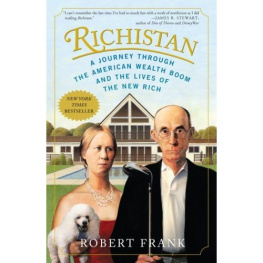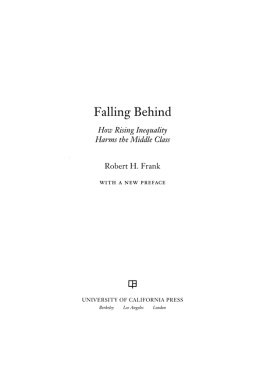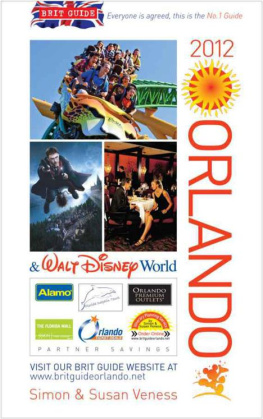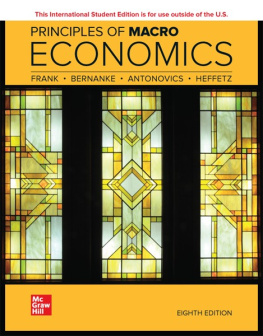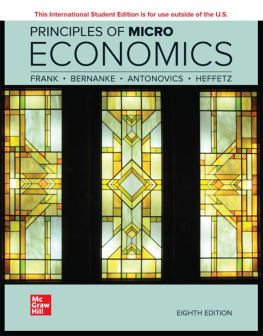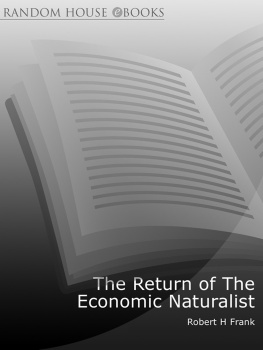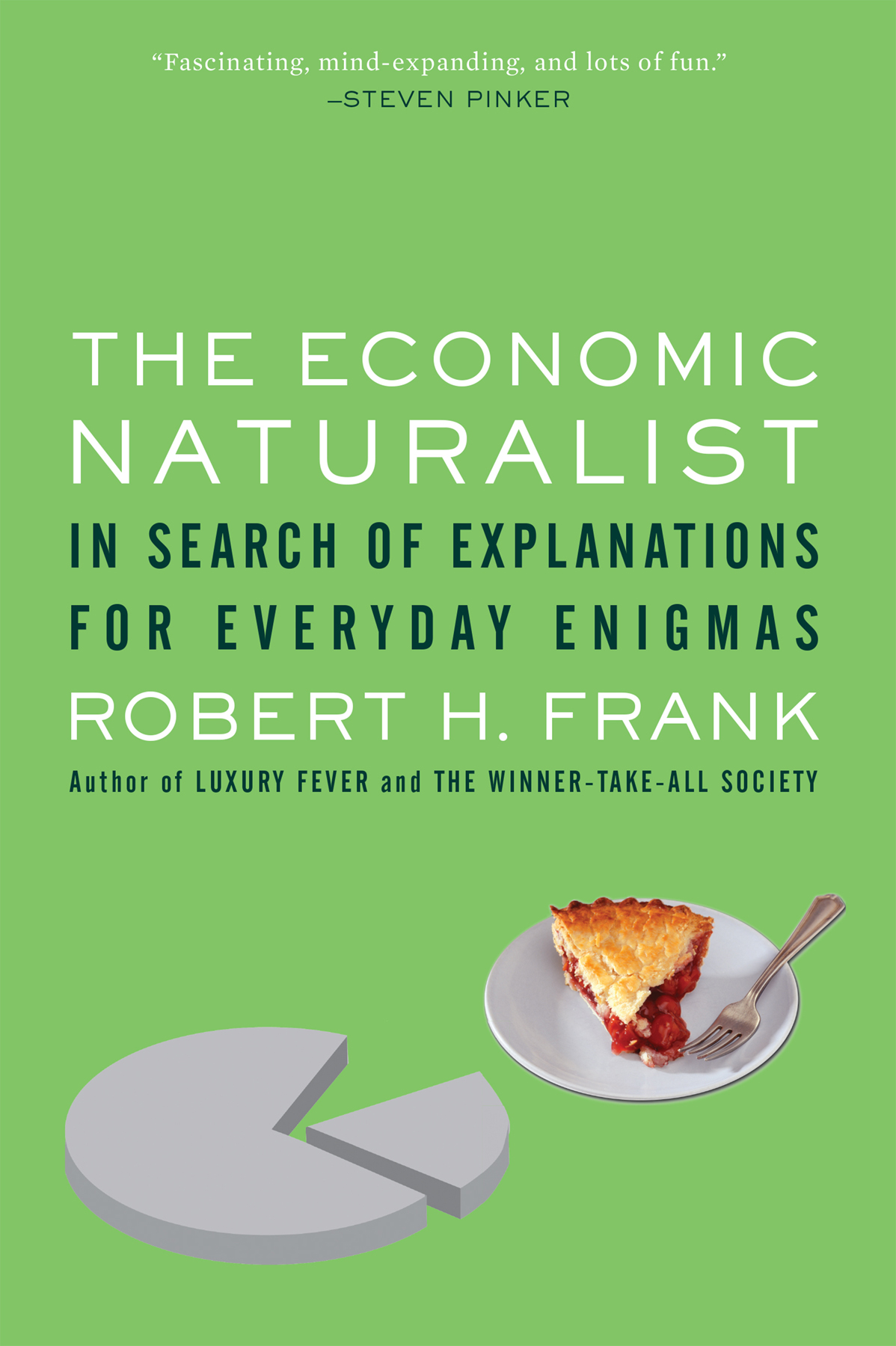Copyright 2007 by Robert H. Frank
Hachette Book Group supports the right to free expression and the value of copyright. The purpose of copyright is to encourage writers and artists to produce the creative works that enrich our culture.
The scanning, uploading, and distribution of this book without permission is a theft of the authors intellectual property. If you would like permission to use material from the book (other than for review purposes), please contact permissions@hbgusa.com. Thank you for your support of the authors rights.
Published by Basic Books, an imprint of Perseus Books, LLC, a subsidiary of Hachette Book Group, Inc. The Basic Books name and logo is a trademark of the Hachette Book Group.
The Hachette Speakers Bureau provides a wide range of authors for speaking events. To find out more, go to www.hachettespeakersbureau.com or call (866) 376-6591.
The publisher is not responsible for websites (or their content) that are not owned by the publisher.
Library of Congress Cataloging-in-Publication Data has been applied for.
ISBNs: 978-0-465-00217-7 (hardcover); 978-0-465-00357-0 (paperback); 978-0-465-00858-2 (2007 ebook); 978-1-5416-7383-0 (2018 ebook)
Frank is the rare economist with a gift for irony. And economic ironies abound in The Economic Naturalist.
New York Times Book Review
The Economic Naturalist will add momentum to the overdue campaign to take economics back from the mathematicians and root it in everyday lives of consumers, workers, investors and entrepreneurs.
Washington Post BookWorld
Bookstores have been blitzed with several popular economics books in recent years. The Economic Naturalist is the best and most readable of the bunch.
D AVID J OHNSEN , www.DJWriter.com
Frank believes that most people learn from stories rather than equations and graphs. Hes surely right. Ive been regaling my 11-year old son with some of Franks little economic puzzles at bedtime and he cant get enough of them.
L ANCE K NOBEL , www.DavosNewbies.com
Smart, snappy and delightful. Bob Frank is one of Americas best writers on economics.
T YLER C OWEN , George Mason University, and author of In Praise of Commercial Culture and What Price Fame?
Fascinating, mind-expanding, and lots of fun.
S TEVEN P INKER , Harvard University, and author of The Blank Slate, How the Mind Works, and The Stuff of Thought
Fun and fascinating! At times itll remind you of a Seinfeld routineDid you ever wonder why baseball managers wear uniforms but basketball coaches wear suits?except that Bob Frank also gives you the real answers.
Steven Strogatz, Cornell University, and author of SYNC
As amusing to read as one of Jay Lenos joke books, but Bob Franks questions and answers are not jokes. They represent pithy observations about our economic lives that will give readers an appreciation of the real substance of economic reasoning.
R OBERT J. S HILLER , author of The New Financial Order and Irrational Exuberance
With his usual wit and style, Robert Frank has written a book that explains why a host of puzzling phenomena in daily life make perfect (economic) sense. Fans of Freakonomics will be fans of Franks book too.
T HOMAS G ILOVICH , co-author of Why Smart People Make Big Money Mistakes and How to Correct Them
Franks new book shows that, when you ask students to look around, they see interesting things; and, sure enough, basic economic concepts can usually give a plausible account of actions and outcomes. This is an excellent way for students to learn economics. To tell the truth, it is also a useful correction to the rest of us.
R OBERT S OLOW , Massachusetts Institute of Technology, and Nobel Laureate in Economics
The book is a real eye-opener, not only with regards to the mysteries of economic decision-making, but also because of the connection with the evolution of the human primate.
F RANS DE W AAL , author of Our Inner Ape
For
Thomas C. Schelling
W hen I first started teaching introductory economics, a senior colleague advised me to begin each class with a joke. It would start students off in a good mood, he explained, and make them more receptive to the ensuing lecture. I never followed his advice. It wasnt that I thought he was wrong in principle. Rather, I thought it would be too hard to come up with a relevant joke each time and felt that telling an irrelevant one would just be pandering.
As luck would have it, however, I stumbled upon a joke that seems just the right vehicle to launch this book. The joke is set in Boston, a city known for its learned cab drivers, many of them dropouts from Harvard and MIT:
A woman lands at Logan Airport, grabs her luggage, and jumps into a cab, hungry for a good New England seafood dinner. Take me to a place where I can get scrod, she tells the driver.
Eyebrow arched, the cabbie turns and says, Thats the first time Ive heard anyone say that in the pluperfect subjunctive.
Few people actually know what the pluperfect subjunctive tense is. I didnt, or didnt realize I did, so I looked it up on ASK JEEVES:
The pluperfect subjunctive (or past perfect subjunctive) tense is used to express a hypothetical situation or an action which is contrary to reality. In this case, the verb in the main clause is conjugated in the conditional form and it is necessary to use the subjunctive in the subordinate clause.
Heres an example that will be familiar to New York Yankees fans from the late 1990s, when Chuck Knoblauch, the teams second baseman, inexplicably lost his ability to complete the short throw to first baseman Tino Martinez: The Yankees would have been out of the inning if Knoblauch had made the throw to first.
As is clear from the definition and example, the woman in the joke didnt actually use the pluperfect subjective tense at all. If the joke works, it is only because most of us havent the foggiest idea what this tense is.
Does it matter? Some psychologists once theorized that people couldnt engage in clear counterfactual thinking unless they knew the technical details of the various subjunctive tenses. But this claim doesnt withstand scrutiny. Notice, for instance, that although most American sports announcers dont seem to know the pluperfect subjunctive (or at least choose not to use it), they manage just fine with counterfactual reasoning. Thus, as Yankees announcer Bobby Murcer used to say during those games in the late 1990s, Knoblauch makes that throw, theyre out of the inning.
Knowing about the pluperfect subjunctive is not a bad thing. But if learning to speak a new language is your goal, the time and effort required to learn the explicit technical details of this tense would be far better spent in other ways. Courses that focus most of their energy on such details are no fun for students, and theyre also astonishingly ineffective.


